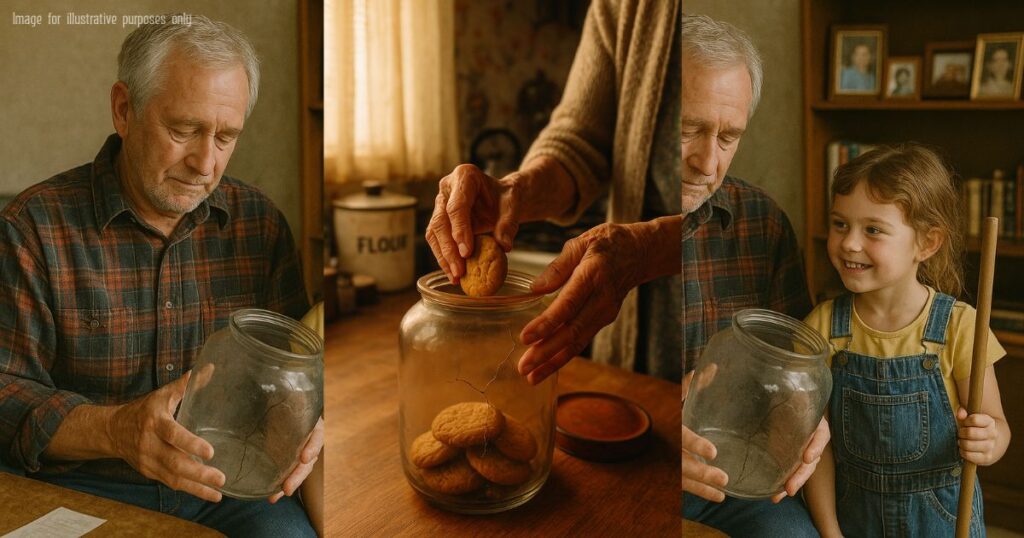By the time we buried her, the cookie jar was empty. But somehow, I’d never felt so full.
Grandma had a rule.
If you wanted a cookie, you had to earn it. Simple as that. It didn’t matter if you were six or sixty — no one reached into that big glass jar without doing something first.
“Wanna taste sweetness?” she’d say, wagging her wooden spoon at us grandkids, “Then go make some of your own.”
Washing dishes counted. So did sweeping the porch, feeding the old mutt Bandit, or pulling weeds around the mailbox. Even tying her shoes when her fingers got stiff with arthritis — that earned you a peanut butter blossom.
Some folks might call that strict. But Grandma wasn’t mean. She was the kind of woman who called you “darlin’” while handing you a mop.
The kind who saved bacon grease in a can on the stove. Who knew the price of flour before she asked how your day was.
Who taught us that dignity didn’t come from what you had — it came from what you gave.
That cookie jar sat like a throne in her kitchen — a wide, heavy glass jar with a rust-red lid and a crack running down one side like a scar.
It always smelled faintly of cinnamon and old wood. I swear, even when it was empty, it smelled sweet.
The last time I saw her, she was wearing her Sunday cardigan on a Tuesday. Said she was feeling chilly “deep in her bones.”
That was the day she made her last batch of snickerdoodles — the soft kind, rolled in sugar and cinnamon, still warm when she handed them out.
I remember her hands, how the veins looked like river maps beneath paper-thin skin. “Don’t eat more than one,” she warned me with a wink. “Save some for your uncle. He’s fixing the porch swing.”
That was her way — always connecting reward to responsibility. Even dying, she didn’t let go of her rules.
She passed in her sleep two nights later. Quietly. No fuss. Just faded out like the last ember in a fireplace she kept going too long.
The funeral was held at the Baptist church two blocks from her house — the same church she’d cleaned every Saturday for nearly thirty years.
People came from counties over. Folks I hadn’t seen in decades.
A man in overalls with grease under his nails told me she’d once brought his daughter soup every day for a month when the girl had mono. “Didn’t even ask,” he said. “Just showed up with that dented old thermos and a smile.”
My cousin Abby gave the eulogy, but it was that moment after — when we all gathered at Grandma’s house — that broke me.
The jar sat on the counter. Empty.
For the first time in my life, I reached in without asking.
Inside, folded like a secret, was a note in Grandma’s shaky script:
“If you’re reading this, you’ve already done enough.”
Funny, how something so simple can sit at the core of who we are.
The Cookie Jar Rule wasn’t about chores. It was about contribution. About not taking sweetness from life unless you’d offered a little bit of it first.
It shaped us. Made us helpers, not takers. My brother Joe’s a firefighter in Missouri.
Says the rule stuck with him when he pulled a boy from a burning garage. “Didn’t think,” he said. “Just moved.” Abby became a nurse. My youngest cousin runs a food pantry out in Tulsa.
We don’t talk about it much. But we all know. That jar raised us just as much as Grandma did.
These days, I keep it on my shelf.
Still cracked. Still smelling like sugar and old wood.
My daughter tried to throw it out once — said we could find a prettier one online. I told her no. “You don’t replace a compass just because it’s old,” I said. “You just keep following it.”
When my grandkids visit, I set the jar out. Still filled with cookies. Still with the rule.
The first time, little Ellie looked confused. “But Papa,” she asked, “why do I have to do something for just a cookie?”
I smiled, handed her the broom, and said, “Because you’re not just getting a cookie. You’re learning how to give first.”
We live in a world now that praises convenience. Swipe this. Tap that. Next-day shipping, same-day everything. Gratitude’s gone quiet, and patience is a stranger.
But that jar — that old cracked jar — it reminds me that the sweetest things in life still come after the effort. After we’ve wiped someone’s tears. After we’ve held open a door. After we’ve swept a porch no one thanked us for.
That jar reminds me of Grandma.
And the rule she left behind, tucked inside us all:
Never take the sweetness before you’ve offered your hands.
“You buried her, didn’t you?” the woman said, her hand already on the jar.
I didn’t recognize her at first.
She showed up two days after the funeral, just as the sky started to spit rain over the porch steps. Thin frame, faded denim jacket, silver hoops in both ears. Maybe fifty, maybe seventy — hard to tell under all that road wear. She stood there without knocking, just looking past me into Grandma’s kitchen like she was remembering a ghost.
“You buried her, didn’t you?” she said.
My hand gripped the edge of the screen door. “You knew her?”
She didn’t answer right away. Instead, she walked past me like she’d been doing it her whole life, boots tapping on the linoleum.
And then her hand went straight to it — the jar.
“You buried her, didn’t you?” the woman said, her hand already on the jar.


